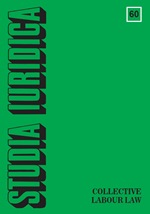Worker’s Participation Prospects. Current State of Affairs and Directions of Changes
Worker’s Participation Prospects. Current State of Affairs and Directions of Changes
Author(s): Jerzy WratnySubject(s): Law, Constitution, Jurisprudence
Published by: Wydawnictwa Uniwersytetu Warszawskiego
Keywords: worker participation; employee council; works council; trade union; company management; European Works Council; the European Economic Interest Grouping; European Company; information and consultation of employees
Summary/Abstract: The paper concerns various forms of worker participation in company management. The first historical form of worker participation was the self-administration of state-owned enterprises, including the administration’s main element – the employee council. However, it has turned out to be incompatible with the legal structure of a commercial law company. Representatives of the staff were secured minority participation in the bodies of the company that emerged from the transformation of a state-owned enterprise – the supervisory board and the management board. These two forms of employee representation (works’ councils and participation of employee representatives in supervisory boards) can be linked, and seen as two stages of the evolution coming from the concept of self-administration. The new forms of worker participation have appeared as a result of the influence of the Community law (e.g. the European Works Councils, the European Economic Interest Grouping or the European Company). Another result of the influence of Community law in that respect are the directives promoting participation solutions (information and consultation of employees) in national companies and undertakings (i.e. works councils). Yet another type of worker representation provided for in Poland’s industrial relations legislation are employee representatives appointed ad hoc, for specific cases. As to the directions of changes of worker participation in Poland, the author points out new rules of appointing of the works councils (without trade unions on their composition), the necessity to review of the Act on Informing and Consulting the Employees and to implement Community standards and, most importanly, the need to work out a scheme making it possible to integrate the dispersed elements of the existing system of worker participation.
Journal: Studia Iuridica
- Issue Year: 2015
- Issue No: 60
- Page Range: 269-282
- Page Count: 14

